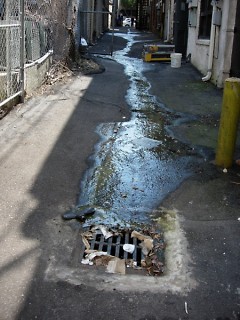On January 28, the Grand Rapids City Commission unanimously passed a resolution establishing the Stormwater Oversight Commission as an advisory body and part of the City's focus on Sustainable Asset Management. The Oversight Commission will be comprised of nine members; one nominated by each City Commission Member and three nominated by the Mayor, representing the Kent County Drain Commissioner, the West Michigan Environmental Action Council (WMEAC) and The Grand Rapids Area Chamber of Commerce.
"We are thrilled that after 18 months, the Commission moved forward establishing the Storm Water Oversight Committee," says Rachel Hood, Executive Director of WMEAC. "This is a critical step in creating transparency around this infrastructure that is worth millions of dollars to the City of Grand Rapids and its residents."
"I think what's paramount about it is that it will put the value of stormwater retention at the forefront. It's a new concept. Do you really hear the average citizen talk about stormwater? I mean I never heard my parents talk about stormwater," says First Ward Commissioner Walt Gutowski.
The primary responsibilities of the Oversight Commission will include reporting on stormwater performance, reviewing expenditures and capital investment strategies and monitoring the achievement of stormwater outcomes. The Commission is also responsible for providing recommendations to the City Manager and City Commission for achieving Stormwater Management Level C, a Level of Service outlined in Grand Rapids Stormwater Master Plan and approved by the City Commission.
"The community needs to be prepared to develop new revenue sources to sustain our stormwater infrastructure for future generations and not to let it decline to a point where it is unhealthy and the city can no longer function," says Hood.
"Level of Service C. Assumes doubling the effective life of infrastructure through rehabilitation methods before complete system replacement (150-years for sewers and manholes); a 10-year cycle for system assessment on infrastructure over 75-years old; corrective maintenance on 15 percent of assets currently beyond their effective life; preventative maintenance on 10 percent of inspected assets; and 10 percent of the capital investment is attributed to green infrastructure practices," the plan states.
The civilian-led effort to create the Stormwater Commission was initiated by WMEAC. In the Sustainably Managing Stormwater in Grand Rapids Report, they recommended that, "A Stormwater Exploratory Group should be established and appointed by the City Commission to make recommendations on still outstanding decisions. The Stormwater Exploratory Group should be equipped with adequate resources to professionally research and recommend specific solutions. The group should be broadly representative of the community."
The formation of the Commission denotes an important step forward for proponents of sustainable stormwater management, say WMEAC representatives. Instead of relying on outside federal or state guidance, City Commission nominees and key community members have the opportunity to guide future policy from within Grand Rapids.
"Decisions about stormwater impact a variety of industries and community stakeholders; the Drain Commission, the development community, commercial and residential property owners, water recreators, adjacent municipalities and more. Thus, good decision-making about Grand Rapids stormwater infrastructure, the Grand River and watershed includes all of those voices and perspectives," says Hood.
In their report, Sustainably Managing Stormwater in Grand Rapids: A Report of the Grand Rapids Community Based Stormwater Planning Initiative, published in August 2012, WMEAC recommends stormwater stakeholders establish a funding mechanism that provides revenue for stormwater services. The report suggests that these revenue streams be based on equal and sustainable funding. To better manage stormwater challenges, they also call for incentivizing property owners who create green infrastructure.
WMEAC outlines a number of options for gaining additional funding to support further Stormwater Management Levels deeper within their report. One of these options involves a Stormwater Utility fee that would require payment for stormwater services by property owners, with incentives for reducing fees by installing green infrastructure that assists in managing stormwater onsite. Another option is a dedicated stormwater millage, an approach that would apply a tax based fee on the taxable value of the property.
Despite the recent approval of the Grand Rapids Parks millage and relative support over the street and sidewalk income tax extension, there are some who are wary of additional income taxes or utility fees with respect to developing future stormwater management.
"We just don't feel like that [Stormwater utility fee or tax] is what our citizens want," says Gutowski. "The goal is that as we do come back [from the recession] and are responsible with the tax payers' dollars, that we will be able to improve on the Stormwater Management Recommendation C. I think it's the hope of all of us on the Commission that we can improve on that, but at this time we think [staying with Recommendation C] is what is optimal for our citizens."
"It is this commission that will ultimately answer the question about future funding sources for stormwater management. Which isn't to say that a utility is eminent," says Hood. "But given the dynamics at play with the state legislature and economy, there is the possibility of a future where those plans don't work out very well."
The Rapidian, a program of the 501(c)3 nonprofit Community Media Center, relies on the community’s support to help cover the cost of training reporters and publishing content.
We need your help.
If each of our readers and content creators who values this community platform help support its creation and maintenance, The Rapidian can continue to educate and facilitate a conversation around issues for years to come.
Please support The Rapidian and make a contribution today.
